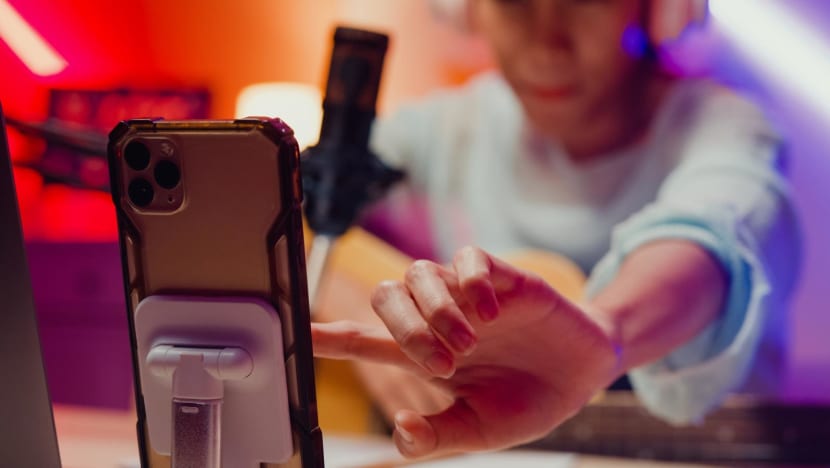'No special immunity': The limits of influencers' powers and what businesses can do about a negative review
With online personalities entering areas of finance and even governance, CNA looks at the extent of their "powers" and how they could be held more accountable.

One downside to the increased popularity of influencers is that they are often not subject matter experts on what they promote, experts tell CNA. (Photo: iStock)

This audio is generated by an AI tool.
SINGAPORE: When a TikTok influencer posted in March what he deemed a “brutally honest” review of food sold by a Ramadan bazaar stall, it went viral, with many others chiming in with their opinions.
The stall then hit back, allegedly sending the food reviewer - who has 8,000 followers - a legal letter demanding an apology among other actions.
At the end of the same month, another influencer - this time a Scottish craft beer reviewer with over 20,000 YouTube subscribers - uploaded a video detailing his negative experience with a Singapore craft beer brewery.
The allegations included the owner being uncomfortable with the reviewer filming content in the brewery, and chiding the Scotsman for his “entitled" attitude.
These cases have stoked negative sentiment online against the businesses, raising questions over whether too much attention and power has been granted to these online personalities.
By definition, an influencer is someone able to influence potential buyers of a product or service by promoting or recommending these on social media.
And in today’s world, influencers are doing much more than just plugging their favourite cafe or T-shirt brand.
For one, there's the emergence of “finfleuncers” who promote financial products despite possibly not having sufficient know-how and authority.
Then there are the “marketing gurus” popping up on social media advertisements, claiming entrepreneurial and investment experience and offering to teach viewers how to make more money.
Governments have also hopped on the bandwagon. Back in 2018, Singapore's Ministry of Finance engaged more than 50 “micro-online influencers” to drum up publicity for the Budget that year.
And last month, the Ministry of Communications and Information (MCI) confirmed that social media influencers are one of the channels that the government uses to communicate to Singaporeans, and that they may be engaged if they can "complement" broader communications efforts.
Do influencers have a greater impact than before?
A US study last year on over 2,000 adults showed that trust in influencers among Gen Zers and millennials had grown from 51 per cent in 2019 to 61 per cent in 2023.
Closer to home, market research company YouGov found earlier this month that 21 per cent of those surveyed in Singapore expressed confidence in “at least some” health advice provided by social media influencers. This is higher than the global average of 16 per cent.
Tellingly, the younger the participants, the more confident: The figures were 28 per cent for Gen Zers and 12 per cent for baby boomers.
The prolonged COVID-19 pandemic may have also played a part.
Full-time content creator Nicholas Teo, who goes by the social media moniker @hargaochunks on TikTok, believes the increased relevance of influencers is also due to the past few years of enforced isolation, which led to many youths immersing themselves in social media.
“There has been a boom recently because of TikTok and COVID; people are just consuming more digital media than traditional media,” said the 29-year-old, who has over 50,000 followers on Chinese-owned TikTok.
Influencers are also striking a chord because they're more relatable than your traditional CEO or celebrity, said the Singapore Management University's (SMU) Lim Sun Sun.
“Previously, our society was very much concentrated on people in positions of power, or people who are particularly famous or successful; these were the very common spokespeople used for various kinds of advertising,” said the professor of communication and technology.
But social media has democratised content creation and now “basically anyone” can develop a following, she added.
“Let’s say (an influencer who is) a mum with two young children who is very good at juggling her work and her kids; she may actually have a certain pull and traction,” she said.
Hence businesses and governments are tapping on influencers with a strong following among demographics that they wish to tailor products or polices to, said Prof Lim.
She added that these influencers don't necessarily need to produce well-crafted content to get their messaging across.
“Sometimes, (influencers) will show certain days of their lives they feel less competent, when they talk about certain setbacks,” she said. “This kind of honesty actually gives them that air of authenticity, that allows the audience to connect with them on a different level than if you use an official spokesperson or a celebrity.”
Are there limits to what influencers can do?
According to legal experts, influencers are generally free to speak and express their opinions – even negative ones – but there are exceptions.
But these have to be grounded in fact or they could be seen as defamation, said law lecturer Alexander Woon.
For example, if an influencer claims in a review that there was a cockroach infestation at a food stall when there was in fact none, the business owner can take legal action for the damage to their reputation.
Other laws that influencers could run afoul of include stirring up enmity against religious groups or inciting people to act in harmful ways, said Mr Woon, who's from the Singapore University of Social Sciences’ School of Law.
For instance, last year rapper Subhas Nair was sentenced to six weeks' jail for attempting to promote ill will among racial and religious groups through online posts.
In 2022, local content creator Titus Low was fined for uploading obscene photos and videos to online platform OnlyFans, and handed a three-week jail sentence for accessing the website though he was ordered not to do so.
Associate Professor Mervyn Cheong from the National University of Singapore added that should an influencer upload a video with the intention of doxxing an individual, that could also be in violation of the Protection from Harassment Act.
As for filming content, the experts said that with no “overarching right to privacy” in Singapore, in general an influencer cannot be prevented from filming in a public space, said Mr Woon, who is also a lawyer at RHTLaw Asia.
But they would have to be careful that in filming, they do not contravene other laws, he said.
For instance, trespassing is an offence, so if an influencer is in a restaurant and they refuse to comply with the owner’s request not to film, then the owner may ask them to leave the premises.
“If they refuse to do so, they could potentially be guilty of trespassing,” said Mr Woon.
One way is to remember that laws that apply to influencers are the same as for any ordinary citizen, said Mr Chooi Jing Yen, a partner at Eugene Thuraisingam LLP.
“There is no special immunity for influencers."
What can businesses do about negative influencer reviews?
Legal action against influencers should be a last resort, said the experts.
Mr Chooi from Eugene Thuraisingam said if a negative review is based on a falsehood, then a more effective avenue could be to make a report to the platform to take the review down.
“Suing is costly, troublesome and takes a long time to get to the desired result. As lawyers we do not generally encourage this path,” he said.
Agreeing, Ms Wong Pei Wen, a senior lecturer of strategic communication at the Wee Kim Wee School of Communication and Information, said that upon receiving a bad review or even an outright accusation from an influencer, a business should not be too quick to react.
It should first assess if the content has truly gone viral, how many stakeholders are involved and if there is real financial impact. It should also wait and see if any of supporters come to its defence, then let the public judge for themselves.
Should a business decide to respond to a negative review, it should do so sincerely and not disproportionately.
“If you go and pick a fight, expect one,” she said.
At the end of the day, the merits of the brand or product should speak for itself.
“A truly reputable brand generally does not need to sue to make its point," said Mr Chooi. "The genuinely good reviews should be enough to overshadow any false reviews."
What are the pros and cons of influencers?
One major downside to the rise of influencers is “inauthentic” content or when they promote products without needing to try them out first, said Mr Teo of @hargaochunks.
He said he has been offered sponsorship deals in such circumstances, but has always insisted on using the product first to test its effectiveness.
“I make it a point to try (the product) consistently," he said. "I feel like it’s my own personal responsibility.”
Mr Teo was unsure if other influencers would do the same.
Prof Lim from SMU said another issue was that influencers are often not subject matter experts on what they promote.
This is especially so for advice on financial products or healthcare, both of which are complex topics and can have serious consequences if improperly followed.
“In other words, don’t blindly believe everything that the influencer you admire advocates; you must exercise your own personal judgment,” she said.
Yet the increased relevance of influencers can have a positive impact as well, especially when they come from marginalised or disadvantaged communities.
Examples include fitness influencer Zoe Zora, who champions inclusiveness for the disabled after being paralysed in a car accident in 2017. There is also Mr Bob Lee, a father to an autistic son who uses TikTok to showcase his child's talents and everyday life.
“People who don’t fit the usual metrics of success can highlight their own story, and this has allowed for a wider diversity of different kinds of narratives to be presented in our society,” said Prof Lim, adding that it gives comfort and empowerment to those facing similar struggles.
The public also gets educated on the challenges faced by the demographic represented by the influencer.
How can influencers be held accountable?
While not specifically targeted at influencers, there are guidelines for online marketing and social media use developed by the Advertising Standards Authority of Singapore (ASAS), an advisory council under the Consumers Association of Singapore.
They contain, among other things, the need to state if a social media post is for marketing purposes; and for these posts to be distinguishable from personal posts.
Commercial relationships such as between influencer and sponsor should also be disclosed.
In a written response to a parliamentary question last year, MCI said those in breach of these guidelines will be asked by ASAS to amend or remove their content.
Assoc Prof Cheong from NUS added that failing to disclose that a social media post is sponsored could also potentially breach the Consumer Protection (Fair Trading) Act.
Beyond these guidelines, it's ultimately up to influencers to self-regulate and through trial and error, avoid courting controversy.
An influencer can be one tasteless post from a fall from grace, and in a way, getting “cancelled” is how the public holds online personalities to account, whether justly or not.
Mr Teo the TikTokker said he had made mistakes that he continues to learn from. In one incident which he did not wish to elaborate on, he fell out with some followers and even after matters were resolved, he continued to receive hate comments and became the subject of negative posts on forums.
Describing how he was taken aback by how far the issue went, he said: “It can be any small mistake, and people are just looking to jump on you and burn you, and throw you to the ground."
Disc jockey Jade Rasif told CNA that such pitfalls can be especially common these days, with influencers able to gain thousands of followers in a matter of months and more prone to gaffes due to their youth and inexperience.
“The advice that would make me popular is (to say) 'do whatever you want and stay authentic'," said the 30-year-old, who has over 500,000 followers on Instagram.
"But the advice that I would give someone I cared about would be to be very careful with what you post; go for media training if you can.
“If you want to make it a career, you have to think about it like a career.”


















